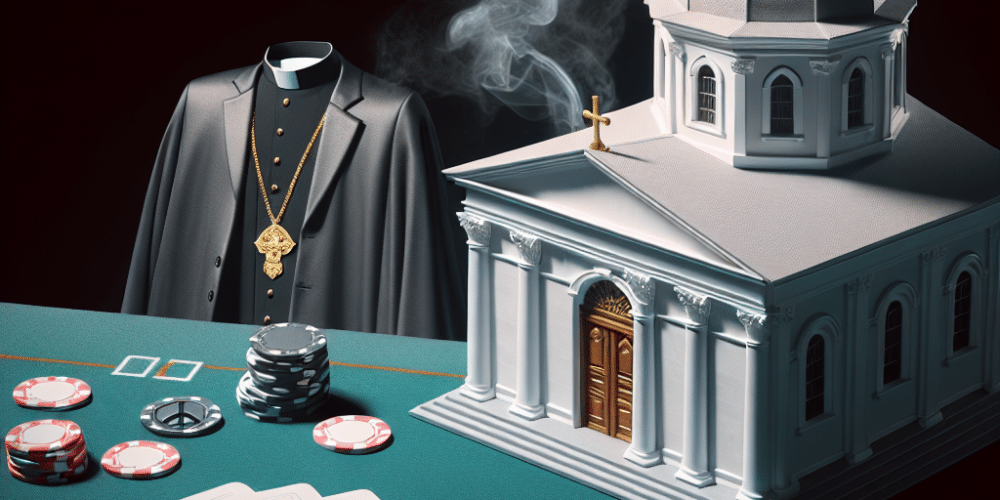Archbishop Nestor of Korsun has been removed from his position by the Russian Orthodox Church after Patriarch Kiril, the Primate of Moscow and all Rus, discovered Nestor’s involvement in poker tournaments in France. This decision marks a significant move by the church, as it coincides with reports of Nestor’s political disagreements with the church’s leadership.
Although the Russian Church has not explicitly linked Nestor’s dismissal to his gambling activities, an investigation by the local media outlet Novaya Gazeta suggests that Patriarch Kiril’s personal disapproval of gambling played a crucial role. The Patriarch, known for his luxurious lifestyle, often wears expensive watches and jewelry, yet he maintains a firm stance against gambling.
Under his real name, Evgeny Sirotenko, Nestor has been actively participating in the Paris poker scene for several years, amassing $47,182 in live tournament earnings according to the Hendon Mob Database, a comprehensive record of poker players worldwide. This activity has now become a pivotal issue, contributing to his removal from a prominent clerical position.
Nestor, who served as the head of the Russian Church in several European countries including France, Belgium, Spain, Italy, Switzerland, Portugal, Monaco, Liechtenstein, Luxembourg, and the United Kingdom, now faces an ecclesiastical trial. This trial will determine whether he should be defrocked, effectively banning him from clergy service. His case reflects a violation of Apostolic Canon 50 of the Council of Laodicea, which prohibits clergy from attending or participating in gambling activities.
However, Nestor’s situation is not solely about gambling. His political views have often clashed with those of the Russian Church’s leadership. While Patriarch Kiril has shown steadfast support for Russia’s government, Nestor has vocally disagreed with certain policies, notably condemning Russia’s 2022 invasion of Ukraine. This stance has intensified the existing ideological divide between him and the church’s hierarchy.
Patriarch Kiril has controversially justified Russia’s military actions by associating them with moral and religious issues, claiming that Ukraine’s acceptance of “gay parades” provoked the conflict. He has even likened President Putin to a “godsend,” a perspective that has drawn criticism and widened the gap between him and more liberal clerics like Nestor.
Nestor’s approach has always been one of defending his priests’ right to independent and liberal thought. His refusal to conform to the church’s official political line is likely a significant factor in his dismissal. According to Novaya Gazeta, this independence marks Nestor as a figure unwilling to bow down to authority, contrasting with Patriarch Kiril’s close alignment with the Kremlin’s policies.
The broader context of this incident highlights ongoing tensions within the Russian Orthodox Church, which is grappling with internal dissent and external political pressures. As Russia continues to navigate its complex socio-political landscape, figures like Nestor who challenge the status quo face significant obstacles.
Furthermore, Nestor’s removal raises questions about the balance between personal conduct and public roles within religious institutions. The church’s decision to focus on his gambling activities rather than his political opinions may reflect a strategic choice to avoid publicizing internal divisions over state policy.
Supporters of Nestor argue that his actions in France were a personal matter, separate from his clerical duties. They contend that the church’s response to his poker playing is disproportionate and possibly serves as a pretext to stifle dissenting voices within its ranks.
Conversely, critics maintain that clergy members hold positions of moral authority and should therefore adhere to the highest ethical standards, both in their public and private lives. They argue that participation in gambling, an activity often associated with vice, undermines the church’s moral teachings and justifies his dismissal.
This situation also sheds light on the broader implications of religious figures engaging in activities deemed contrary to their faith’s teachings. It prompts a reevaluation of how religious institutions manage personal behavior among their leadership and the extent to which personal freedoms are permitted within those roles.
As Nestor’s trial approaches, the outcome will not only determine his future within the Russian Orthodox Church but also serve as a barometer for the church’s current trajectory concerning governance, morality, and political alignment. The results will likely resonate beyond the religious community, impacting perceptions of the church’s independence and its relationship with the state.

David Garato is a luminary in gaming journalism, renowned for peeling back the curtain on the gaming world with his witty and insightful commentary. A decade into weaving stories from the pixelated edges of indie games to the expansive universes of AAA titles, David’s work is a thrilling blend of analysis and adventure. When not writing, he’s live-streaming, sharing his gaming exploits with an engaged and growing audience. David doesn’t just write about games; he lives them, making him a trusted guide in the gaming community.
















